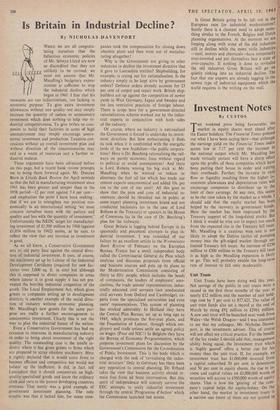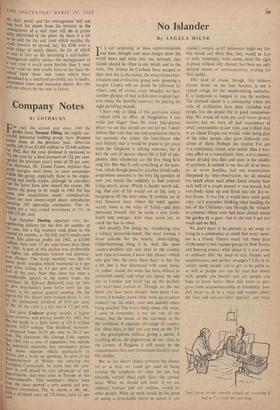Investment Notes
By CUSTOS
THE weekend press being favourable, the market in equity shares went ahead after the Easter holidays. The Financial Times pointed out what 1 have been saying here—that although the earnings yield on the Financial Times index seems low at 7.17 per cent the increase In the national output which Mr. Maudling has made virtually certain will have a sharp effect upon the profits of those companies which have been putting their house in order and cutting their overheads. Further, the increase in cash flow or liquidity resulting from the higher in- vestment allowances and depreciation rates will encourage companies to distribute up to the limit of their earnings. At any rate, this seems to be the view taken by the market as a whole. I should add that the equity market has been helped by the recovery in government bonds. Here the market has been impressed by the Treasury support of the long-dated stocks. But I think it would be wise not to expect too much from the expected rise in the Treasury bill issue. Mr. Maudling is a cautious man and is not likely to adopt the Dalton tactics of pumping money into the gilt-edged market through un- limited Treasury bill issues. An increase of £250 million to £300 million in the Treasury bill issue is as high as the Maudling expansion is likely to go. This will probably enable the long-term rate of interest to fall only moderately.
Unit Trusts
Unit Trusts have been doing well this year. Net savings of the public in unit trusts were a record in the first three months of the year at nearly £12 million and the number of unit hold- ings rose by 5 per cent to 857,425. The value of unit trust funds also set a record at the end of March by rising £91- million to £296+ million. A new unit trust will be launched next week from Wales—the Welsh Dragon—and I was interested to see that my colleague, Mr. Nicholas Daven- port, is the investment adviser. This of course will not affect my critical practice. For the benefit of the lay reader I should add that, management ability being equal, the investment trust which is 'highly geared' offers a better run for his money than the unit trust. lf, for example, an investment trust has £1,000,000 invested from a capital subscribed 50 per cent in debentures and 50 per cent in equity shares, the rise in In- come and capital values on £1,000,000 worth of securities will accrue to £500,000 worth of equity shares. That is how the 'gearing' of the com- pany's capital helps the equity-holder. On the other hand, the market in investment trusts Is a narrow one (most of them are not quoted in the daily press) and the management will not buy back his shares from the investor as the management of a unit trust will do at prices daily advertised in the press. So there is a lot to be said for the unit trust which enables the small invettor to spread, say, his £100 over a wide range of equity shares, the list of which Is sent to him on his becoming a unit-holder. Management ability varies—the management of a unit trust is much more flexible than it used to be—and the best results have so far been ob- tained from those unit trusts which have specialised in a restricted portfolio, say in banks, investment trusts and insurance shares. But this volt not always be the case in future.



































 Previous page
Previous page